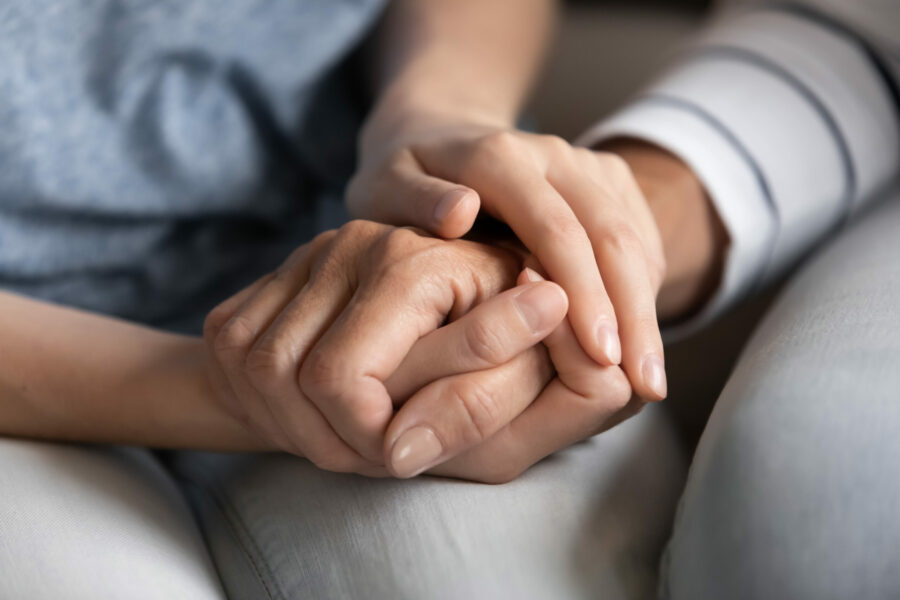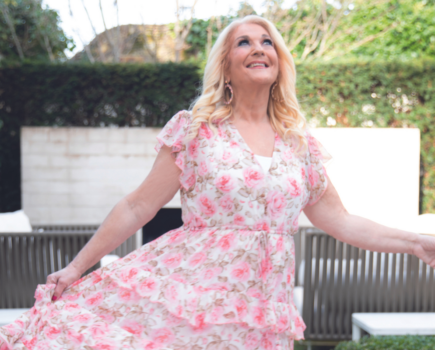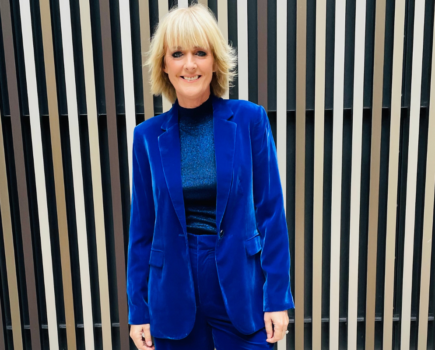Miscarriage raises a tangle of emotions and not just for the bereaved parents. Gillian Thornton takes a touching granny’s point of view, addresses the sad and painful memories it can re-ignite but how you can be the best emotional support ever.

I knew something was wrong the moment I answered the phone. Instead of my daughter’s usual sunny greeting, I could hear her voice breaking as she struggled to get her words out. ‘It’s not good news.’
Kate had been feeling reassuringly nauseous since her second pregnancy had been confirmed three weeks earlier. So it was a complete shock to find no heartbeat at the 12-week scan. Worse still to be sent home to await a call for surgery, her womb still occupied by an immobile tenant.
My heart ached for Kate and her husband, the abrupt severance of their dreams for a second child. And whilst they had been outwardly cautious about celebrating the impending new life too early, inwardly I knew they were optimistic. But miscarriage is a family affair, reverberating out beyond the bereaved couple.
You’re so used to being able to make things better for your children, even into adulthood, and this time you really can’t.
And when a prospective new member of the family fails to materialise, expectant grannies suddenly find themselves in the front line.
‘You’re so used to being able to make things better for your children, even into adulthood, and this time you really can’t’, commented one friend after her daughter lost her second pregnancy. ‘I almost felt I had failed her as a mother because nothing I could say or do could heal her pain.’
I was sad, of course, for the child I will never get to know, but I’m luckier than many expectant grandparents. I have two beautiful granddaughters already. Kate has a mischievous 3-year-old whilst her brother Andy became a father just two weeks before his sister’s unexpected loss. A bittersweet fortnight for the whole family.

Gillian and John with son Andy’s daughter Ella, July 2021
Lending support
So what do you say as a grandparent – prospective or established – that doesn’t sound like a platitude? It certainly rarely helps to point out that they can try again, nor to say the baby was not meant to be. Both may be true, but to the grieving parents, their embryo was a much-wanted son or daughter. They don’t want to be part of a statistic.
Hopefully you are close enough to your own daughter to know what will reassure her. But suppose the bereaved mum is your daughter-in-law? If she’s close to her own mum, it’s easy to feel that your role is less important. And what about the disappointed dad? How do you approach him?
A close friend speaks movingly of the challenge she faced when her son and daughter-in-law also faced a flat-line screen at their 12-week-scan, but on the other side of the world.
“She came to terms with the loss through yoga and the sisterhood of girlfriends, but my son readily admits now that he found his comfort in local bars. We’ve always been close and it was so hard to know he was struggling, and yet be powerless to do anything except talk via video link.”
Many mothers of our generation may not be aware that the Miscarriage Association, founded in 1982, offers a wealth of advice on all aspects of baby loss via their website miscarriageassociation.org.uk. Particularly helpful is the downloadable leaflet, Supporting Someone You Know.
The best thing a grandparent can do is to be there emotionally for their child and their partner too, whatever they are feeling.
“The best thing a grandparent can do is to be there emotionally for their child and their partner too, whatever they are feeling,” says Ruth Bender Atik, National Director of the Miscarriage Association. “Your instinct will be to comfort them, to make it better, to take away the pain. But it is often the words, ‘I’m so sorry’, the listening, the empathetic ‘mmms’ and nods, the hugs or touch on the arm (if possible) that make the most difference in helping them through.
“Be ready for their feelings and needs to ebb and flow, to change over time, perhaps in ways you don’t expect. Ask how they are doing in the days and weeks that follow, perhaps especially as they approach their due date or special family times.
“Above all, don’t underestimate the difference you can make with quiet, consistent empathy and understanding when they are needed – and with normality when they are not. They will thank you for it.’
Painful memories
For many of our generation, miscarriage in our children also brings back painful memories of our own losses. It was my dad’s birthday, nearly 40 years ago, when my husband and I revealed my parents were to become grandparents. But next morning, just one week before Christmas, I woke to hideous pains and, by teatime, was in hospital waiting for the last traces of my 9-week pregnancy to be eradicated.
After the initial commiserations, my parents didn’t really know what to say. Not because they didn’t care, but as the generation who’d been through a war, they were used to brave faces and carrying on. So, I put on a brave face too, got through the festivities, and went back to the office to colleagues who had no idea.
But a month after my miscarriage, my hormones were upside down. For the only time in my life, my body told my head that it didn’t want to get out of bed, and just for once, I listened and sought medical help.
‘You’ll just have to pull yourself together,’ my crusty woman GP pronounced dismissively. ‘It happens all the time.’ But not to me it didn’t. I felt utterly adrift. So, I changed practices to a sympathetic young doctor whilst my husband and I wondered how many miscarriages we could endure before we admitted defeat.
Thankfully the issue of baby loss is approached very differently today. We are all encouraged to share tragedies, release emotions, and air anxieties as we strive for maximum mental health. If I’m honest, the embryo growing inside my body hadn’t really taken shape inside my head. My rudimentary knowledge of my growing baby came largely from a couple of well-thumbed baby books and from monthly parenting magazines.
But today, from the very moment of conception, a host of apps tell expectant mums about the daily development of the new life inside them. And whilst this helps to build a close relationship through nine months of invisibility, it must make any loss all the harder to bear.
Long-term understanding of miscarriage
Coming to terms with baby loss isn’t neatly resolved in a convenient time frame nor with a simple course of medication, and this is the time when grannies can really help. You don’t have to have miscarried yourself to understand the upheaval of hormones re-establishing their old rhythm. So, expect to be an emotional support for some months ahead, as milestones like due dates and Mother’s Day become something to dread rather than look forward to.
Friends with new babies or successful pregnancies are an emotional challenge for bereaved mums too, and it can be tough too in the support team, especially if miscarriage brings back unhappy memories of your own loss. But for mums of our generation, this can be a time of greater closeness with daughters or daughters-in-law.
For many of us, that longed-for grandchild will eventually come along, but it can be an agonising wait. “My daughter and I were in bits when she lost her first IVF pregnancy on Christmas Eve,” one friend confided. “I’ll never know how we got through it, which was hard on our husbands who were dealing with their own emotions. So far, further attempts have sadly failed to take, and both time and money are now running out.”
For our family, the next baby is still in the planning stages and, in the meantime, the support team is still very much in place. Whether we are grannies already, or still in- waiting, mums of our generation are in a unique position to help the next generation at this vulnerable and emotionally draining point in their lives. And maybe, in so doing, come to terms with our own demons into the bargain.
For more in-depth people reads, head here.








